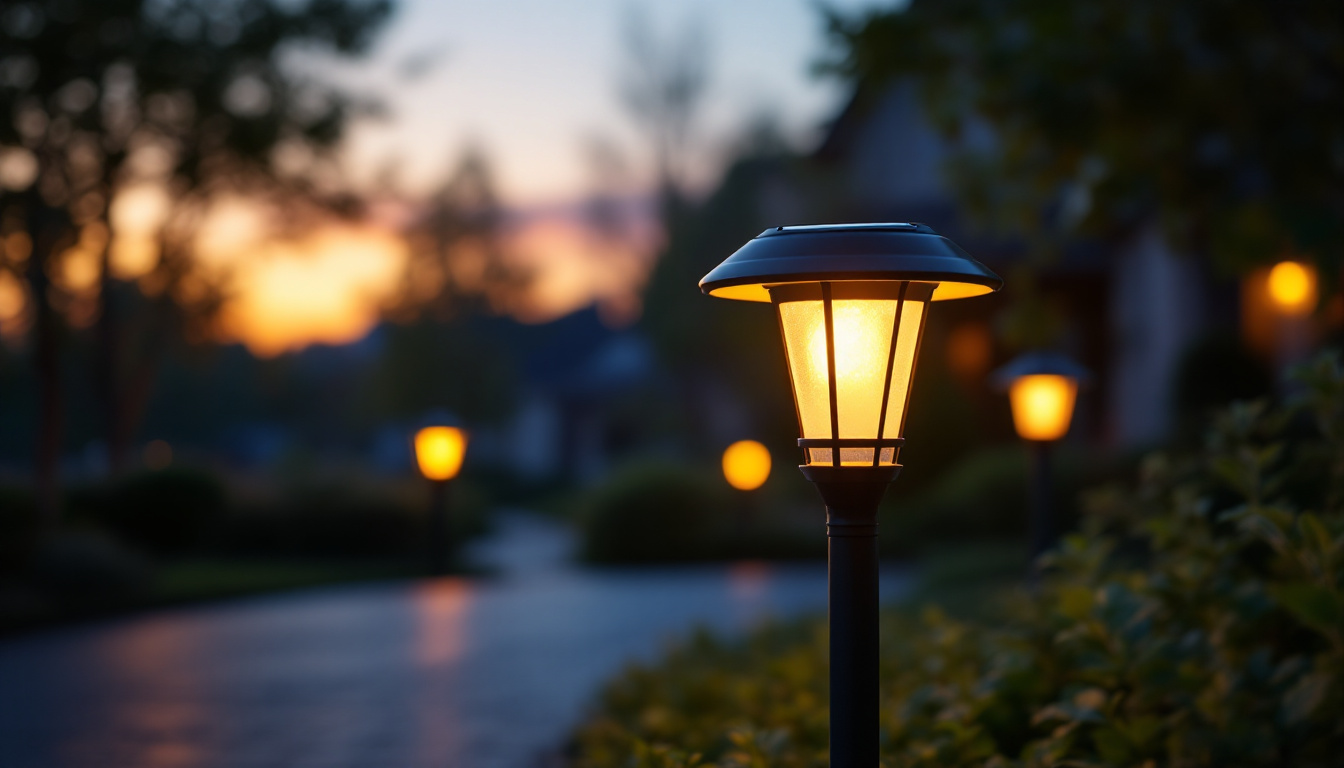
In recent years, solar driveway lamps have gained popularity among homeowners and lighting contractors alike. These eco-friendly lighting solutions offer numerous benefits, including reduced energy costs and minimal environmental impact. solar lamps harness the power of the sun, converting sunlight into energy to illuminate pathways and driveways without relying on traditional electricity sources. This not only lowers utility bills but also contributes to a greener planet by reducing reliance on fossil fuels. However, despite their advantages, many lighting contractors make common mistakes when installing and recommending solar driveway lamps. Understanding these pitfalls can help contractors enhance their services and ensure customer satisfaction.
This article aims to highlight the most frequent mistakes made by lighting contractors regarding solar driveway lamps. By addressing these issues, contractors can improve their installation practices and provide better guidance to their clients, ultimately leading to more successful projects. For instance, one common oversight is the failure to assess the specific lighting needs of a property. Each driveway is unique, and factors such as size, surrounding vegetation, and the intended use of the space can significantly influence the choice of solar lamps. Properly evaluating these elements ensures that the selected fixtures provide adequate illumination while enhancing the aesthetic appeal of the property.
Additionally, many contractors underestimate the importance of quality in solar lighting products. Not all solar lamps are created equal; some may have subpar batteries or inadequate solar panels that fail to charge effectively during cloudy days. By prioritizing high-quality products and educating clients about the differences between various models, contractors can help ensure long-lasting performance and reliability. Furthermore, understanding the local climate and seasonal variations can guide contractors in recommending the most suitable solar lamps, ensuring they meet the needs of their clients year-round.
One of the most significant mistakes that lighting contractors make is underestimating the efficiency of solar panels. Many assume that all solar panels perform equally, which is far from the truth. The efficiency of a solar panel can vary significantly based on its type, brand, and even the specific model.
There are three main types of solar panels: monocrystalline, polycrystalline, and thin-film. Each type has its own efficiency ratings and suitability for different applications. Monocrystalline panels are known for their high efficiency and space-saving design, making them ideal for residential applications where space may be limited. Polycrystalline panels, while generally less efficient, can be more cost-effective for larger installations. Thin-film panels, on the other hand, are less efficient but can be advantageous in specific scenarios, such as on uneven surfaces.
Another factor that affects solar panel efficiency is the geographical location and weather conditions. Areas with abundant sunlight will naturally yield better results than those with frequent cloud cover or inclement weather. Lighting contractors must take these factors into account when recommending solar driveway lamps to clients, ensuring that the selected products are suitable for the specific location.
Proper placement of solar driveway lamps is crucial for maximizing their effectiveness. Many contractors fail to consider the optimal positioning of these lamps, leading to poor performance and customer dissatisfaction. The following aspects should be taken into account when determining the placement of solar lamps.
Solar driveway lamps require direct sunlight to charge effectively. Before installation, contractors should assess the area for potential obstructions, such as trees, buildings, or fences, that may block sunlight. Conducting a thorough site evaluation can help identify the best locations for installation, ensuring that the lamps receive adequate sunlight throughout the day.
Another common mistake is improper spacing between solar lamps. If lamps are too far apart, the driveway may remain poorly lit, defeating the purpose of the installation. Conversely, placing them too close together can create an overly bright area, leading to light pollution and discomfort. Contractors should consider the brightness of the lamps and the overall layout of the driveway to determine the optimal spacing and arrangement.
The battery capacity of solar driveway lamps is a critical factor that is often overlooked by contractors. A lamp’s battery determines how long it can operate after sunset, and insufficient capacity can lead to inadequate lighting during the night. Understanding battery specifications can help contractors make informed decisions when selecting solar lamps.
There are various types of batteries used in solar lamps, including lead-acid, lithium-ion, and nickel-metal hydride. Each type has its own advantages and disadvantages. For instance, lithium-ion batteries tend to have a longer lifespan and better efficiency compared to lead-acid batteries. However, they may also come at a higher cost. Contractors should weigh the benefits and drawbacks of each battery type to ensure they select the best option for their clients’ needs.
In addition to battery type, contractors should also evaluate the capacity of the battery. A higher capacity allows for longer operational times, which is essential for areas with extended nighttime hours. It is crucial to match the battery capacity with the expected usage and the specific requirements of the installation site.
Solar driveway lamps are often marketed as low-maintenance solutions, but they still require some level of upkeep. Contractors who neglect to inform clients about maintenance requirements may find themselves facing complaints and dissatisfaction down the line.
Dust, dirt, and debris can accumulate on solar panels, reducing their efficiency. Contractors should advise clients to clean the panels regularly to ensure optimal performance. Additionally, periodic inspections can help identify any issues with the lamps, such as damaged wiring or malfunctioning batteries, allowing for timely repairs.
Seasonal changes can also impact the performance of solar driveway lamps. In winter, for example, snow accumulation can obstruct sunlight exposure. Contractors should educate clients on how to manage these seasonal challenges, ensuring that the lamps continue to function effectively throughout the year.
After installation, it is essential for contractors to provide clear instructions to clients regarding the operation and maintenance of solar driveway lamps. Failing to do so can lead to confusion and frustration, ultimately resulting in negative feedback.
Contractors should take the time to explain how the solar lamps operate, including how to turn them on and off, adjust brightness settings, and troubleshoot common issues. Providing a user manual or a quick reference guide can be beneficial, giving clients a resource to consult when needed.
In addition to operating instructions, it is crucial to offer clients maintenance guidelines. This includes information on how often to clean the panels, what cleaning materials to use, and how to check the battery status. By providing comprehensive maintenance guidelines, contractors can empower clients to take care of their solar driveway lamps effectively.
While functionality is paramount, aesthetic appeal should not be overlooked when selecting solar driveway lamps. Many contractors focus solely on performance, neglecting the importance of design and style. This oversight can lead to installations that clash with the overall look of the property.
Solar driveway lamps come in various designs, from modern and sleek to traditional and ornate. Contractors should consider the architectural style of the home and surrounding landscape when recommending lamps. A well-chosen design can enhance the property’s curb appeal and provide a cohesive look.
The color temperature of the light emitted by solar lamps can also impact the overall ambiance of the driveway. Warmer color temperatures tend to create a more inviting atmosphere, while cooler temperatures can feel harsher. Contractors should discuss these options with clients to ensure that the selected lamps align with their preferences and the desired aesthetic.
Local regulations and zoning laws can significantly impact the installation of solar driveway lamps. Contractors who overlook these regulations may face legal issues or fines, which can damage their reputation and business. It is essential to stay informed about local guidelines to ensure compliance.
Zoning laws can dictate where and how solar lamps can be installed. Some areas may have restrictions on the height, brightness, or placement of outdoor lighting. Contractors should familiarize themselves with these regulations to avoid potential conflicts and ensure that installations meet local standards.
In some cases, permits may be required for the installation of solar driveway lamps. Contractors should check with local authorities to determine if permits are necessary and ensure that all required documentation is submitted. This proactive approach can save time and prevent complications during the installation process.
As the demand for solar driveway lamps continues to grow, lighting contractors must strive to elevate their standards and avoid common mistakes. By understanding the intricacies of solar technology, proper placement, maintenance requirements, and aesthetic considerations, contractors can provide exceptional service to their clients.
Ultimately, the goal is to create a successful installation that meets the needs and expectations of homeowners. By addressing these common pitfalls, lighting contractors can enhance their reputation, improve customer satisfaction, and contribute to the growing trend of sustainable lighting solutions.
In a rapidly evolving industry, staying informed and adapting to new technologies and practices is essential. By committing to continuous learning and improvement, lighting contractors can position themselves as leaders in the field of solar driveway lamps, paving the way for a brighter and more sustainable future.
Ready to avoid the common pitfalls and set new standards in solar driveway lamp installations? Choose LumenWholesale for your lighting needs and gain access to our top-quality, spec-grade lighting products at unbeatable wholesale prices. With our commitment to cutting out the middleman, you can trust that you’re getting superior lighting products without inflated markups. Our extensive selection is designed to meet the highest industry standards, ensuring reliable, high-performance lighting for every project. Plus, with free shipping on bulk orders, you can enjoy premium lighting at the best value — without hidden fees or compromises. Elevate your solar lighting installations by visiting Wholesale Lighting at the Best Value and experience the LumenWholesale difference today.

Discover how industrial style light fixtures can transform your space with their unique blend of functionality and aesthetics.

Discover the crucial role indoor ceiling lights play in the success of lighting contractors.

Discover essential tips on LED bulbs track lighting for contractors, including energy savings, installation insights, and industry trends—boost your projects today!.

Discover why lighting contractors should prioritize greenhouse grow lights in commercial projects.